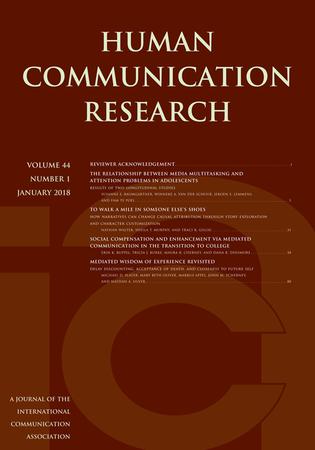当机器和旅行车启发式竞争时:了解用户对人工智能和众包事实核查冲突的反应
IF 3.3
1区 文学
Q1 COMMUNICATION
引用次数: 7
摘要
三个实验测试了在人/机器(不一致)和事实核查系统透明度的不同条件下,机器和从众启发式是否会缓和人们对事实核查主张的信念。在实验中,当人工智能(AI)和众包代理的事实核查一致而不是不一致时,人们更有可能将自己的信念与声明保持一致。启发式为这一过程提供了进一步的细微差别,特别是当一个特定的代理提出真理判断时。也就是说,当人工智能代理的事实核查表明该声明可能是真的但不是假的时候,对机器启发式有更强信念的人更有可能判断该声明为真的;同样,当众包代理对该声明进行事实核查时,相信从众启发式的人更有可能判断该声明为真的,而不是假的。让系统对用户更透明似乎不会改变结果。本文章由计算机程序翻译,如有差异,请以英文原文为准。
When Machine and Bandwagon Heuristics Compete: Understanding Users’ Response to Conflicting AI and Crowdsourced Fact-Checking
Three experiments tested if the machine and bandwagon heuristics moderate beliefs in fact-checked claims under different conditions of human/machine (dis)agreement and of transparency of the fact-checking system. Across experiments, people were more likely to align their belief in the claim when artificial intelligence (AI) and crowdsourcing agents’ fact-checks were congruent rather than incongruent. The heuristics provided further nuance to the processes, especially as a particular agent suggested truth verdicts. That is, people with stronger belief in the machine heuristic were more likely to judge the claim as true when an AI agent’s fact-check suggested the claim was likely true but not false; likewise, people with stronger belief in the bandwagon heuristic were more likely to judge the claim as true when the crowdsource agent fact-checked the claim to be true but not false. Making the system more transparent to users does not appear to change results.
求助全文
通过发布文献求助,成功后即可免费获取论文全文。
去求助
来源期刊

Human Communication Research
COMMUNICATION-
CiteScore
8.20
自引率
2.00%
发文量
28
期刊介绍:
Human Communication Research is one of the official journals of the prestigious International Communication Association and concentrates on presenting the best empirical work in the area of human communication. It is a top-ranked communication studies journal and one of the top ten journals in the field of human communication. Major topic areas for the journal include language and social interaction, nonverbal communication, interpersonal communication, organizational communication and new technologies, mass communication, health communication, intercultural communication, and developmental issues in communication.
 求助内容:
求助内容: 应助结果提醒方式:
应助结果提醒方式:


